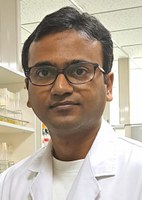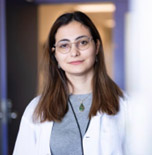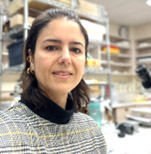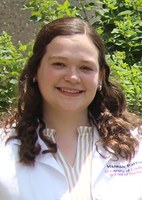Shirin Ghods, Ph.D.

Assistant Professor
Dept. of Oral Immunology and Infectious Diseases
Room 360B, School of Dentistry
Office Phone: 502-852-1288
Email:shirin.ghods@louisville.edu
Research Interests: Nutritional and Metabolic Regulation of Microbiome Dynamics and Host Inflammatory Responses
My research focuses on how nutritional and metabolic signals regulate microbiome dynamics and host inflammatory responses in the context of chronic and systemic disorders. Specifically, my work examines the molecular pathways through which nutrient and metabolite availability reprogram microbial physiology, alter virulence potential, and modulate host immune function. A major emphasis is placed on the study of clinical samples from specific patient populations with distinct metabolic and immune profiles, as these groups represent unique models for investigating how altered metabolic environments shape both oral disease progression, particularly periodontal inflammation, and broader systemic outcomes.
A key aspect of my research program is exploring how these nutrient- and metabolite-driven interactions extend beyond oral disease to influence systemic inflammatory conditions and susceptibilities associated with altered immune–microbiome balance. By integrating insights from experimental systems and patient-derived specimens, my research connects molecular mechanisms to clinically relevant outcomes. This framework not only enables the discovery of how microbial adaptation influences inflammation at the local infection site but also reveals its impact on systemic health. Looking ahead, I plan to expand these approaches to additional biological models.
My laboratory integrates microbial genetics, molecular pathogenesis, host–pathogen interaction models, and systems-level analyses to uncover how metabolic cues reshape disease trajectories. Our work spans a wide range of approaches, including genetic manipulation and mutagenesis, transcriptomic and RNA-based analyses, protein and molecular assays, and metabolite quantification using biochemical and analytical methods. We also employ cell culture systems and functional assays to evaluate microbial phenotypes, virulence potential, and host responses under defined nutritional and metabolic conditions.
By combining these complementary strategies, my laboratory seeks to define the mechanistic links between microbial adaptation and host signaling pathways, establishing how nutritional and metabolic environments drive both local and systemic inflammation. A distinctive aspect of this work is the study of specific patient populations with distinct metabolic and immune states, who serve as unique models of altered host–microbiome interactions. Through these investigations, my laboratory aims not only to clarify how oral health is connected to systemic disease but also to uncover fundamental principles of host–microbiome interactions that may guide the development of targeted preventive and therapeutic strategies.
This work is supported by federal and institutional funding and advanced through collaborations with clinicians and basic scientists across multiple disciplines. I also mentor graduate students and postdoctoral researchers. My long-term goal is to provide a comprehensive view of how nutritional and metabolic signals reshape microbial virulence and host pathways, driving disease susceptibility and progression, with the ultimate aim of identifying new biomarkers and therapeutic targets for oral and systemic inflammatory diseases.
Core Research
- Nutritional & Metabolic signals
- Microbiome dynamics
- Host inflammatory responses
- Microbial physiology
- Microbial adaptation
- Virulence potential
- Host–pathogen interactions
Focus Areas
- Periodontal inflammation
- Oral disease progression
- Systemic inflammatory conditions
- Specific patient populations
- Distinct metabolic and immune profiles
- Local and systemic health outcomes
Research Approaches & Methods
- Microbial genetics
- Molecular pathogenesis
- Genetic manipulation and mutagenesis
- Transcriptomics and RNA techniques
- Proteomics analysis
- Metabolite analyses
- Analytical and systems-level methods
- Cell culture models
- Functional and phenotypic assays
- Translational research integrating experimental and clinical samples
Goals & Impact
- Mechanistic links between microbes and host signaling
- Nutrient- and metabolite-driven microbial virulence
- Host immune modulation
- Biomarker discovery
- Preventive and therapeutic Strategies
- Translational research
ORCID: https://orcid.org/0009-0006-5743-5883
LinkedIn:https://www.linkedin.com/in/shirin-ghods-2379777b/
Ghods Lab Team Members (Present & Past)
 | Afsaneh Bahrami, PhDPostdoctoral Fellow |
|---|---|
 | Jenifer Sahayanathan, PhDPostdoctoral Fellow |
 | Lauren FullerDMD/MSOB Student |
 | Md Hasif Sinha, PhDFormer Postdoctoral Associate |
 | Saba Tohidkhah, DMDFormer Researcher |
 | Mozhgan Mousavi, M.Sc.Former Research Technician I |
 | Irshad Arshad, M.Sc.Former Research Technician I |
 | Hannah PattonDMD/Summer Research Student |
Grants & Funding
Active
2025–2028: NIH/NIGMS COBRE5P20GM125504-08: Cobalamin serves as a key redox-active mediator, protecting Porphyromonas gingivalis from oxidative stress. Research Project Leader (RPL).
2024–2027: NIH/NIDCR R03DE033707-01: Cobalamin inPorphyromonas gingivalisPathogenicity, Principal Investigator.
2024–2028: Start-Up Funding, The Role of Cobalamin in Regulating Host Immune Responses to Periodontal Pathogens, University of Louisville, School of Dentistry.
Completed
2024–2025: NIH/NIGMS GM125504 Pilot Project: Cobalamin’s Impact on Genomic–Metabolic Adaptations and Immunostimulatory Potential inP. gingivalis.
Representative Publications
- The multifaceted role of c-di-AMP signaling in the regulation of Porphyromonas gingivalis lipopolysaccharide structure and function. Frontiers in Oral Microbes and Host. 2024.
- Growth of Porphyromonas gingivalis on human serum albumin triggers programmed cell death. Journal of Oral Microbiology. 2023.
- Atypical cyclic di-AMP signaling is essential for Porphyromonas gingivalis growth and regulation of cell envelope homeostasis and virulence. npj Biofilms and Microbiomes. 2022.
- Porphyromonas gingivalis Capsule-Conjugate Vaccine Protects from Experimental Oral Bone Loss. Frontiers in Oral Health. 2021.
- Amino Acids as Wetting Agents: Surface Translocation by Porphyromonas gingivalis. The ISME Journal, 2019.
My Bibliography: https://scholar.google.com/citations?hl=en&user=SAxUpmAAAAAJ
Affiliation
- University of Louisville, Center for Biomedical Research (COBRE), in Functional Microbiomics, Inflammation and Pathogenicity
- American Association for Dental, Oral, and Craniofacial Research (AADOCR)